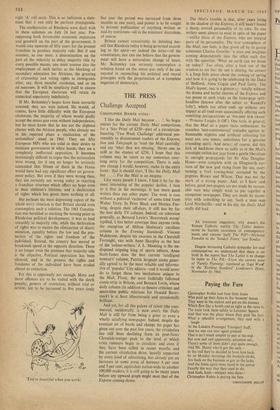THE PRESS Challenge Accepted
CHRISTOPHER BOOKER writes : 'I like the Daily Mail because . . .'. So begin entries for the current Daily Mail competition for a 'Star Prize' of £250—part of a circulation- boosting 'Two Week Challenge' addressed pre- sumably to discontented readers of the Express, Sun and Telegraph to 'read the Mail carefully' and say 'what they are missing.' Never, one to sniff at the chance of £250, I hope that this column may be taken as my somewhat over- long entry for the competition. There is only one change I would, however, make in the entry form: that it should start, 'I like the Daily Mail but . . .'. For the Mail is an enigma.
Like many people I know, I find it by far the most interesting of the popular dailies. I turn to it first in the mornings. It has more good writers than any other paper. The week is rare without a political 'exclusive' of some kind from Walter Terry. In Peter Black and Monica Fur- long, despite their off-days, it still has by far the best daily TV column. Indeed, on television generally, as Bernard Levin's 'Baverstock scoop' typified, it has better coverage than anyone (with the exception of Milton Shulman's excellent column in the Evening Standard). Vincent Mulchrone, despite his excesses in the Churchill Fortnight, vies with Anne Sharpley as the best of the 'colour-writers.' J. L. Manning is the un- disputed reigning king of sports editors, Anne Scott-James does the best current 'intelligent woman's' column, Patrick Sergeant seems gener- ally agreed to be the most reliable and informa- tive of 'popular' City editors—and it would never do to forget those two institutions unique to the Mail, Flook, the most faithfully followed comic-strip in Britain, and Bernard Levin, whose daily column (in addition to theatre criticism and spare-time public relations for Donald Bayer- stock) is at least idiosyncratic and occasionally brilliant.
And yet, for all this galaxy of talent (the corn- mercial, incidentally, is now over), the Daily Mail is still far from being a great or even a wholly satisfying newspaper. Indeed, despite the constant air of bustle and change the paper has given out over the past few years, the circulation has still been declining from its post-News Chronicle-merger peak to the level at which crisis rumours begin to circulate; and even if they have been stilled in recent months and the current circulation drive, heavily supported by every kind of advertising, has already put on increases in some areas of between 4 per cent and 5 per cent, equivalent nation-wide to another 100,000 readers, it is still going to be many years before any upward graph might meet that of the Express coming down. The • Mail's trouble is that, after years living in the shadow of the Express, it still hasn't found a sharp, overall personality of its own. Its star writers seem almost to exist in spite of the paper —unlike those of the Express, who are integral parts of its personality. The true atmosphere of the Mail, one feels, is that given off by its gossip columnist Charles Greville- 'a man one imagines coming despondently into the office each day with the question, 'What on earth can we drum up today?' Too often, after a look out of the window to see that the sun is shining, the answer is a limp little piece about the coming of spring and how it is going to be celebrated by the Duke of Bedford, Alma Cogan and Paul Getty. The Mail's layout, too, is a giveaway:- totally without the drama and harlot charms of the Express and too prone to such tricks as the front-page split- headline (known after the editor as 'Randall's folly'), which too often ends up without any impact at all (and even occasionally offering such unwitting juxtapositions as 'POLARIS SUB CRASH' --'Princess Laughs It Off'). One feels, in general. that the Mail as a paper lacks enthusiasm. Its ceaseless 'non-controversial' crusades against in- flammable nighties and artificial colouring for meat are, one senses, substitutes for a genuine crusading spirit. And never, of course, did this lack of backbone show so sadly as in the Mail's overnight switch last year from a gentle liberalism to outright propaganda for Sir Alec Douglas- Home—even complete with an Illingworth car- toon of the new god rising from the sea, over- turning a frail rowing-boat occupied by the pygmies Brown and Wilson. That was not the mark of a strong paper.. And, as 1 .have said before, good newspapers are not made by reason- , able men who simply want to put together a competent newspaper. They are made by eccen- trics with something to say. Such a man was Lord Northcliffe—and in his d4 the Daily Mail really did lead.
An irreverent suggestion: why doesn't the Roman Catholic weekly The Tablet demon- strate' its fearlds awareness of contemporary issues and rename itself The Pill?—Nicholas Timudin in the 'Sunday Times: last Sunday.
Despite increasing Catholic sympathy for oral contraceptives we understand that there is no truth in the report that The Tablet is to change its name to The Pill.—From the current issue of 'Fancily Planning.' reprinted as 'Last Word' in the 'Evening Standard' Londoner's Diary, November 10, 1964.














































 Previous page
Previous page